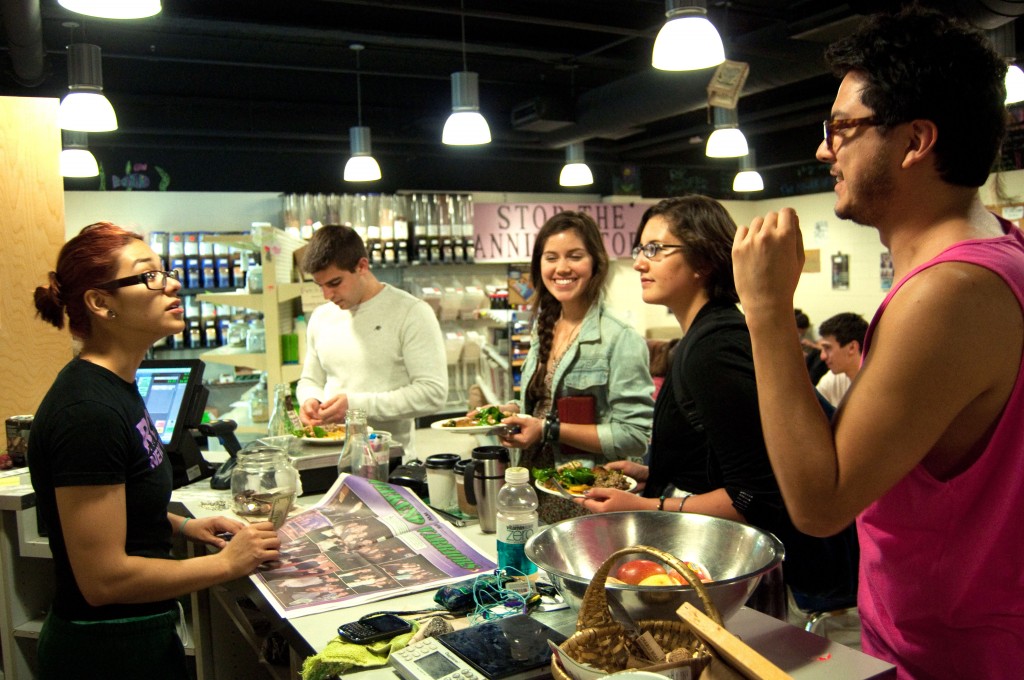
The Food Co-op, an enigma to most Binghamton University students, is one of the only places on campus where Sodexo does not have a monopoly on a hot lunch. Located in the basement of the Old University Union in room 30, the Food Co-op is not the easiest place to find for first-timers. If you follow the faint smell of puppy chow down the halls past the billiards room, you will soon be greeted by an eclectic mix of people in a haven of organic food. For some of these people, the Co-op is their second home. For others, it’s a rustic dining and rest spot that serves as a break from the monotony of high-sodium dining halls and food courts.
At 8:30 a.m. Monday through Friday, three paid undergraduate student chefs and a number of student volunteers begin preparing lunch, to be served at noon to around 50 people. The changing daily menu is based on the creativity of the kitchen staff and what ingredients they have to work with, but they always try to find a balance of protein, carbs and vegetables. Though the Food Co-op has its own recipe book, the recipes tend to be as spontaneous as the menu.
The Co-op emphasizes the use of local and organic ingredients. Every dish is vegetarian approved, but extremely rich and decadent, heavy on the spices and low in sodium, which is the antithesis of any other food dispenser on campus.
People who are not used to eating vegetarian food may be initially turned off by the buffet of meat substitutions, but don’t knock it before you try it. The Co-op food is a filling and flavorful alternative to pasta from the University Union.
When I visited on Thursday, they served teriyaki tofu, spicy scalloped potatoes, rice with wild mushrooms, mock cock salad (chicken salad made of tempeh) and Popeye’s salad (spinach salad). After consuming a small plastic to-go container of scalloped potatoes and rice for $3.25 at 4 p.m., I was sated by fresh and natural food made by people who love to sustain the earth.
For those who are not members or regulars in the Co-op community, eating there for the first time is slightly intimidating. The dining area seats about 40 people, and everyone seems to have a passion for environmentally conscious and healthy living. Conversation over who is a better recycler can potentially be blocked out by an impromptu guitar jam session during the peak hour from 12 to 1 p.m.
However, the Co-op recognizes that not everyone who wants to eat organic, homemade food can withstand the crunchy and sometimes crowded environment and provides the option of take-out containers in addition to sit-down plates.
The preparation that goes into the hot lunch is the driving force of the tight-knit community in the Food Co-op, but members also promote organic and community living through other means. During regular Co-op hours there is a small grocery store that sells packaged organic snacks, local dairy and meat products, grains, dried fruit, seeds, snacks, cooking ingredients in bulk and eco-friendly paper goods.
The Co-op always serves freshly brewed coffee from Laveggio for $1 and tea so people can sip hot beverages while they sit on a distressed couch next to a sleeping hippie and read a book from the lending library. On the last Tuesday of every month, the Co-op hosts an open mic for striving musicians and artists to perform their crafts.
The Food Co-Op thrives on environmentally conscious food distribution and individuals’ dedicated volunteering. While it has a steady base of members, the non-committal nature of this campus organization makes it a great place for students who simply want to learn how to cook. Every Monday to Friday, starting at 8:30 a.m., the Co-Op is happy to accept volunteers with personal motives as well as community ones. Volunteers can be as involved as they would like, but it is more beneficial to be a member, which costs $5 per semester or $8 per year and gives you 5 percent off everything in the store. Members who volunteer one hour per week get a 10 percent discount on hot food and a half-off meal for each hour worked in the kitchen.


